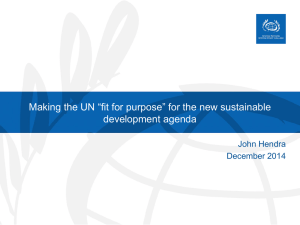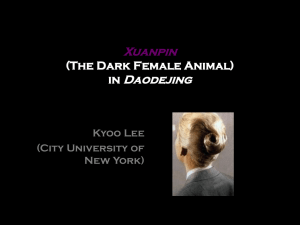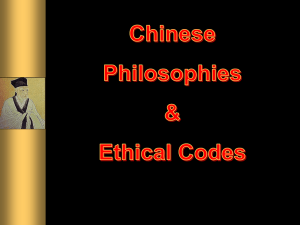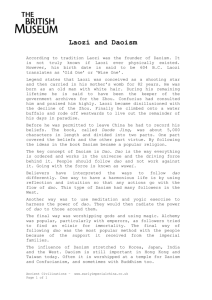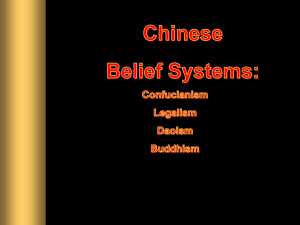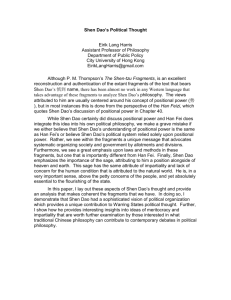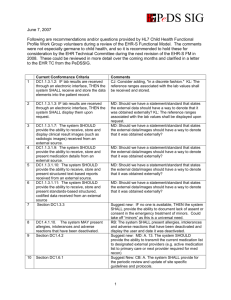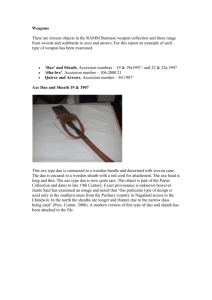THE DOCTRINE OF THE MEAN (Zhongyong 中庸)
advertisement
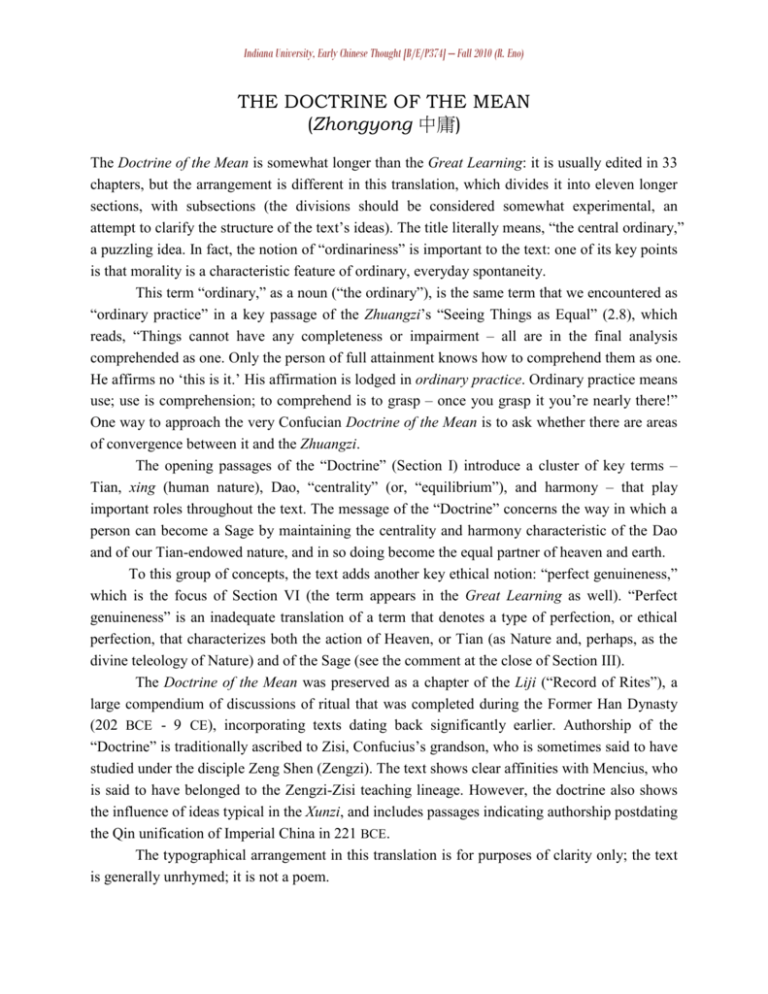
Indiana University, Early Chinese Thought [B/E/P374] – Fall 2010 (R. Eno) THE DOCTRINE OF THE MEAN (Zhongyong 中庸) The Doctrine of the Mean is somewhat longer than the Great Learning: it is usually edited in 33 chapters, but the arrangement is different in this translation, which divides it into eleven longer sections, with subsections (the divisions should be considered somewhat experimental, an attempt to clarify the structure of the text’s ideas). The title literally means, “the central ordinary,” a puzzling idea. In fact, the notion of “ordinariness” is important to the text: one of its key points is that morality is a characteristic feature of ordinary, everyday spontaneity. This term “ordinary,” as a noun (“the ordinary”), is the same term that we encountered as “ordinary practice” in a key passage of the Zhuangzi’s “Seeing Things as Equal” (2.8), which reads, “Things cannot have any completeness or impairment – all are in the final analysis comprehended as one. Only the person of full attainment knows how to comprehend them as one. He affirms no ‘this is it.’ His affirmation is lodged in ordinary practice. Ordinary practice means use; use is comprehension; to comprehend is to grasp – once you grasp it you’re nearly there!” One way to approach the very Confucian Doctrine of the Mean is to ask whether there are areas of convergence between it and the Zhuangzi. The opening passages of the “Doctrine” (Section I) introduce a cluster of key terms – Tian, xing (human nature), Dao, “centrality” (or, “equilibrium”), and harmony – that play important roles throughout the text. The message of the “Doctrine” concerns the way in which a person can become a Sage by maintaining the centrality and harmony characteristic of the Dao and of our Tian-endowed nature, and in so doing become the equal partner of heaven and earth. To this group of concepts, the text adds another key ethical notion: “perfect genuineness,” which is the focus of Section VI (the term appears in the Great Learning as well). “Perfect genuineness” is an inadequate translation of a term that denotes a type of perfection, or ethical perfection, that characterizes both the action of Heaven, or Tian (as Nature and, perhaps, as the divine teleology of Nature) and of the Sage (see the comment at the close of Section III). The Doctrine of the Mean was preserved as a chapter of the Liji (“Record of Rites”), a large compendium of discussions of ritual that was completed during the Former Han Dynasty (202 BCE - 9 CE), incorporating texts dating back significantly earlier. Authorship of the “Doctrine” is traditionally ascribed to Zisi, Confucius’s grandson, who is sometimes said to have studied under the disciple Zeng Shen (Zengzi). The text shows clear affinities with Mencius, who is said to have belonged to the Zengzi-Zisi teaching lineage. However, the doctrine also shows the influence of ideas typical in the Xunzi, and includes passages indicating authorship postdating the Qin unification of Imperial China in 221 BCE. The typographical arrangement in this translation is for purposes of clarity only; the text is generally unrhymed; it is not a poem. 2 THE DOCTRINE OF THE MEAN Section I: Section II: Section III: Section IV: Section V: Section VI: Section VII: Section VIII: Section IX: Section X: Section XI: The source of the center. Cleaving to the central mean. The common basis of the Dao Confucius on the sages. On government. Perfect genuineness. The creativity of nature. The Dao of the Sage The Dao of the ruling junzi. The sage’s power of virtue. The invisibility of ultimate greatness [The traditional 33 chapter divisions of the text, which vary greatly in length, are indicated by notations in the right margin, placed at the head of each chapter.] Section I: The source of the center That which is ordained by Tian ∗ is called our nature; to lead by our nature is called the Dao; to cultivate the Dao is called the teaching. One may not deviate from the Dao for so much as an instant; that from which one may deviate is not the Dao. [ch. 1] Thus the junzi is alert and cautious about what he does not see, is fearful about what he does not hear. Nothing is more visible than the obscure, nothing is plainer than the subtle. Hence, the junzi is cautious when he is alone. Pleasure and anger, sorrow and joy: before they emerge they are called centered; emerging by the proper rhythms they are called harmonious. Centered: this is the great root of the world. Harmonious: this is the ultimate Dao of the world. Reaching centered harmony, heaven and earth take their proper places and the things of the world are nurtured thereby. ∗ Where tian appears to represent a spiritual deity, the term is rendered here as Tian. Where it seems to denote the sky or is used in the compounds “heaven and earth” or “Son of Heaven” (king), it is rendered “heaven.” The terms junzi (the exemplar of moral human excellence) and ren (utmost moral excellence) are left untranslated. 3 Section I outlines for us the ideal character that we should aspire to. The link between the Dao to our Tian-ordained nature can be understood as a reflection the Mencian tradition. The initial formula tells us that we should monitor the feedback of our spontaneous moral dispositions and let them lead us: the Dao is found within our hearts, a message we see also in The Great Learning. The ideal person’s engaged focus is always alert to what lies beyond its awareness, in the incipient beginnings of new challenges or the faintest of moral twinges. The junzi recreates within the natural harmony of the cosmos. His emotions emerge from his centered person and remain centered (the phrase “proper rhythms” more literally reads: “hits the beat at the center”), replicating a cosmic balance. The thematic importance to the text of the idea of centrality, denoting perfect balance, is signaled in the title. Section II: Cleaving to the central mean 1. Confucius said, The junzi keeps to the mean in action; the small man reverses the mean in action. The mean of the junzi is such that he is always exact in his timeliness; the reversal of the mean of the small man is such that he will scruple at nothing. [ch. 2] “Keeping to the mean” translates the word “center,” which is used as a verb here. Timeliness is a major theme in the text. We see it here in the developed sense of the junzi’s ability to discern the right action in every context. In sections II.3-4 below we see the formula often associated with timeliness: the Dao does not prevail, yet Confucius does not stint in his efforts. 2. The Master said, The mean in action is the ultimate! Few among the people can long cleave to it. [ch. 3] The difficulty of staying just at the center is a recurrent issue for this section: see Sections II.6-8, below. 3. The Master said, That the Dao will not be put into practice, I know it. The wise go beyond it and the ignorant do not reach it. That the Dao will not be made brilliant, I know it. The worthy go beyond it and the unworthy do not reach it. [ch. 4] No one does not eat, but few can know the taste. The final phrase can be compared to The Great Learning, B.4: “When the mind is not focused one does not see what one is looking at, hear what one is listening to, or know the taste of the food one eats.” 4 4. The Master said, The Dao is not put into practice. [ch. 5] 5. The Master said, [ch. 6] How great was the wisdom of Shun! Shun loved to ask questions and loved to inquire into teachings near at hand. He put evil in the shadow and raised up good. He grasped both ends, but employed the center in ruling the people – Was this not Shun! 6. The Master said, Men all say, “I am wise.” Drive them into a net or catch them tumbling into a trap; none knows how to evade them! Men all say, “I am wise.” But let them choose the mean in action and none can keep to it for a round month! [ch. 7] 7. The Master said, Yan Hui was a man who, having chosen to cleave to the mean in action, would clutch any point of goodness tight in his fist, press it to his heart and never lose it. [ch. 8] 8. The Master said, One may level all the states of the world, decline high rank and salary, tread upon naked blades, and yet be unable to cleave to the mean in action. [ch. 9] Reading sections II.6-8, we can appreciate that Confucian teachers were concerned that students who were impressed with their own level of ethical attainment recognize that the task was not to hit the moral mark from time to time, but to persist until one had so transformed oneself that one could no longer ever miss the mark, because one’s instincts and desires had become fully aligned with the goal of moral living (to cite familiar metaphors, just as a virtuoso violinist always fully aims for the right note or tone, or the tennis player always fully aims to return the volley). This is what Confucius was said to have achieved only at age seventy (Analects, 2.4). The effort of reaching the threshold of full transformation is probably the implicit theme of II.9, which follows. 9. Zilu asked about strength. The Master said, The strength of the South or the strength of the North? Or do you mean your type of strength? [ch. 10] 5 Recall that the disciple Zilu is consistently portrayed as martial and valorous, but also as impetuous and headstrong to the point of rudeness. Instructing through leniency, not responding in kind to unjust acts: such is the strength of the South – the junzi dwells in this. To sleep in one’s armor, to die unflinchingly: such is the strength of the North – your type of strong man dwells in this. The junzi acts harmoniously but does not join in vulgarity – the strength of the strong! He stands at the center and does not lean – the strength of the strong! When the state possesses the Dao, he is unchanged from when his way was blocked – the strength of the strong! When the state is without the Dao, he remains unchanged even though it means death – the strength of the strong! 10. The Master said, [ch. 11] Those who seek to live in hiding and practice strange arts will still be spoken of in later ages – but I do not do these things. A junzi may guide his way with respect to the Dao and fall by the wayside halfway – but I cannot cease. A junzi may cleave to the mean in action by fleeing from the world to live unknown and feel no regret – but only a sage could do so. Some Confucian models, such as the sage hermits Bo Yi and Shu Qi, men who remained loyal to the Shang and refused to participate in Zhou society, resemble Daoists in their retreat from the world of human governance. Confucians, burdened by the traditional moral authority of these legendary exemplars, could not preclude that such behavior may be “timely.” But they defend against any need to endorse Daoist eremitism by restricting such extreme measures to sages fully committed to the utopian vision of perfect society, men who would never respond to challenges with simple escapism. Section III: The common basis of the Dao The passages in this section generally tie the notion of the Dao to the basic structures of good society: love between parents and children; dedication to one’s roles; piety in ancestral sacrifice. Cultivating the Dao begins in discovering the challenges in these types of action and mastering them. 6 1. The Dao of the junzi is broad yet hidden. Any ignorant husband or wife may partake in knowledge of it, yet reaching to its ultimate nature, there is that which even the sage does not know of it. Even an unworthy husband or wife may practice of it, yet reaching to its ultimate nature, there is that which even the sage cannot act of it. [ch. 12] Heaven and earth are great indeed, yet there are still those things which lead men to despair in them. So it is that when the junzi speaks of what is great, there is nothing in the world that can bear it up; yet when he speaks of what is small, there is nothing in the world that can split it. The Poetry says, The kite flies high, striking the heavens; The fish leap in the abyssal depths. That is to say that both high and low are fully delved. The Dao of the junzi forges its basis on the common husband and wife; yet reaching to its ultimate nature, it delves into heaven and earth. Confucians (such as Mencius, but also Xunzi) took the position that all people are born with similar qualities with respect to ethical potential. In III.1, common people – including women (a rare concession in Confucian texts) – share in possession of the Dao within, and the effort to fully actualize one’s moral potential never ceases, even in the sage. Like The Great Learning, here and below we see authoritative texts such as the Book of Poetry deployed to carry moral messages that their original authors may not have intended. 2. The Master said, The Dao does not depart far from man. If a man creates a dao that departs far from others, it cannot be taken as the Dao. The Poetry says, When cutting an axe handle, The model is never far. [ch. 13] Say you hold an axe handle to cut an axe handle and glance aside at the handle in your grasp – it would be like taking this to be distant. The junzi governs men by means of what is human; once they have reformed, he stops. 7 Devotion and reciprocity are not far from the Dao. If you would be unwilling to have something done to you, do not do it to others. Note here the Golden Rule formula. It is preceded by mention of the two virtues that the disciple Zeng Shen identifies as Confucius’s “single thread” in Analects 4.15. There are four aspects to the Dao of the junzi: not one am I able to fulfill! To serve my father with that which I seek from my son – I cannot do it! To serve my ruler with that seek from my subordinates – I cannot do it! To serve my elders with that which I seek from my juniors – I cannot do it! To first practice towards my friends what I seek from them – I cannot do it! In the practice of common virtue, in exercising care in normal speech, if you fall short, dare not fail to exert yourself; if you overstep, do not carry on to the end. In speaking, look to your action. In action, look towards your speech. How can a junzi fail to be ever alert! 3. The junzi simply acts according to his natural place; he does not long for what is outside of it. If he is naturally in a position of wealth and high status, he acts according to the norms of wealth and high status. If he is naturally in a position of poverty and low status, he acts according to the norms of poverty and low status. If he is naturally placed among the nomad tribes, he acts according to the norms of the nomad tribes. If he is naturally placed amidst confusion and trouble, he acts as is appropriate for times of confusion and trouble. There is no situation in which the junzi is not fully self-possessed. When in high position, do not be arrogant towards those below. When in low position, do not prevail upon those above. Make yourself upright and do not seek what you wish in others, then you will encounter no resentments. Above, do not bear resentment towards Tian; [ch. 14] 8 below do not blame men. * Hence the junzi dwells in what is simple, awaiting his destiny (ming). The small man engages in precipitous practices in search of a lucky fortune. The Master said, There is in archery that which resembles the junzi. Should one miss the target, he seeks for the cause within himself. Passage III.3 is a very clear illustration of how deeply the idea of contextualized ethical action is in Confucianism. One’s imperatives do not come from a rule book – they are conveyed by situational contexts and are always relative to your particular role within that context. 4. The Dao of the junzi may be compared to the saying that a distant journey must [ch. 15] begin from nearby, that a climb to great heights must begin from below. The Poetry says, Wife and children in loving concert, Like zither strings all thrummed. Brothers all in unison – In happy harmony and joy. How sound, your household! Take joy in wife and offspring. The Master said, “How these parents have acted in accord!” 5. * The Master said, How abundant is the virtue of ghosts and spirits! You look at them and do not see, listen to them and do not hear, yet they inhabit affairs without exception. They make all the people of the world fast and don ritual robes in offering up sacrifices. Thrilling, how they seem to hover above, how they seem to be at every side. [ch. 16] Note that this invokes Analects 14.35, which is also interestingly referred to in Mencius 2B.13. In the Analects, the passage reads: The Master said, “No one recognizes me!” Zigong said, “How is it that this is so?” The Master said, “I do not complain against Tian, nor do I blame men. I study what is lowly and so get through to what is exalted. Is it not Tian who recognizes me?” 9 The Poetry says, The arrival of the spirits Cannot be anticipated, Much less may one be remiss. The plain clarity of the subtle – in just this way perfect genuineness cannot be obscured. This is the initial mention in this text of the term “perfect genuineness.” This translation actually renders a single term (cheng 誠), which can refer to sincerity of intent, moral authenticity, or absolute integrity (it is often translated as “sincerity”). Section VI is particularly focused on this term, and there it is raised to a cardinal principle of the cosmos. I have translated this term under the theory that it conveys a spontaneous, undeliberated match between impulse and action. In the person, the impulse is the moral nature, seamlessly tied to unpremeditated ethical behavior. In the cosmos the impulse is creativity, seamlessly expressed in an unceasing dynamic of birth and renewal. The Doctrine of the Mean treats these as expressions of a single principle in two realms (cosmic and human), and in this model it may echo Xunzi’s ideal of the sage forming a triad with heaven and earth, a concept specifically invoked in VI.5. Section IV: Confucius on the sages The theme of the section is the passage of Tian’s Mandate from the legendary sage Shun, whom the Mencian stream of Confucianism celebrated above all others, through the founding leaders of the Zhou: Ken Wen, who brought civilization (wen) to the Zhou people, exalting the tradition of his forbears, King Tai and King Ji, King Wen’s heir King Wu, who overthrew the Shang Dynasty, and his younger son, the Duke of Zhou, who protected and perfected the new order of the Zhou, preserving the throne for King Wu’s infant son. The section draws moral lessons from each sage, and closes with a pious invocation of the Lord on High, a term that is synonymous with Tian, who was worshiped at a grand rite outside the city walls, called the “suburban sacrifice.” 1. The Master said, Did not Shun fulfill great filiality? His virtue was that of a sage, he was exalted as the Son of Heaven, his wealth was the possession of all within the four seas, his ancestors were feasted by him at the clan shrines and his descendants protected them. Thus it is that great virtue inevitably gains its proper position, inevitably gains its proper stipend, inevitably gains its proper fame, inevitably gains its proper longevity. [ch. 17] 10 Thus it is that when Tian gives birth to a thing it treats it with generosity according to its potential. Hence when plants are cultivated they should be nurtured, but when they lean askance, they should be cut down. The Poetry says, The junzi of great goodness, How abundant his fine virtue! Fit for the people, fit for all others, He receives his stipend from Tian Which protects and assists him with the Mandate Extended from Tian. Thus great virtue inevitably receives the mandate. 2. The Master said, Utterly without cares: would this not characterize King Wen? His father was King Ji; his son was King Wu. His father initiated it; his son continued it. [ch. 18] King Wu extended the thread from King Tai, King Ji, and King Wen. As soon as he donned the clothes of war the world was his. His brilliant fame in the world was never diminished, he was exalted as the Son of Heaven, his wealth was the possession of all within the four seas, his ancestors were feasted by him at the clan shrines and his descendants protected them. In the end, King Wu received the Mandate. The Duke of Zhou perfected the virtue of Wen and Wu. He conferred posthumous royal titles on King Tai and King Ji, and in sacrifices to the former lords he employed the rituals for the Son of Heaven. This rule was then extended to the patrician lords, the grandees, and the common people: If the father is a grandee (dafu) and the son a mere gentleman (shi), bury the father as a grandee, sacrifice to him as a gentleman. If the father is a gentleman and the son a grandee, bury the father as a gentleman, sacrifice to him as a grandee. 11 The mourning period of a year was extended to all grandees. The mourning period of three years applied to the Son of Heaven. But when mourning a parent, there are no distinctions of rank: all are the same. 3. The Master said, King Wu and the Duke of Zhou, were they not of ultimate filiality! The filial son extends well the intentions of his father and carries on his father’s affairs. In spring and autumn he repairs the ancestral shrines, sets out the ancestral vessels, lays out the ancestral robes, and offers up the food of the season. [ch. 19] The rituals of the ancestral shrines are the means of ordering the lines of descent, alternating the generations of zhao and mu. * The ordering of ritual ranks distinguishes the exalted from the humble. In ordering the ceremonial affairs, distinctions reflect degrees of worthiness. In the rituals of toasting, superiors toast inferiors, extending the rites to the humble. In the closing banquet the white-haired take the places of honor to represent ordering by age. To occupy his post, to carry out his rituals, to perform his music, to respect what he honored, to love what he cherished, to treat the dead as one treats the living, to treat the departed as one treats those who remain, This is the ultimate of filiality. The suburban rite of sacrifice ministers to the Lord on High; the rituals of the ancestral shrines minister to one’s forbears. He who comprehends the rite of the suburban sacrifice or the meaning of the great spring and autumn sacrifices can rule a state as though it lay in his palm. * Zhou shrines separated lineages into alternating generations called zhao and mu. The significance of this practice is not fully understood. 12 Section V: On government 1. Duke Ai of Lu inquired about governing. The Master said, The governance of Wen and Wu is laid out in the bound records. When men such as these live, such governance is implemented; after they die it withers away. It is the Dao of humankind to be quick at government as the Dao of earth is to be quick at growing things. Governments grow like rushes. [ch. 20] The success of a government thus lies in the men it chooses. In selecting men, judge by your own person. Refine your person by means of the Dao. Refine the Dao by means of ren. Ren (仁) means a man (ren 人): * cleaving to one’s kin is its foremost element. Righteousness (yi 義) means appropriate (yi 宜):** honoring the worthy is its foremost element. The degrees that govern cleaving to one’s kin and the ranks that govern honoring the worthy are the things that give birth to ritual. Hence the junzi cannot fail to refine his person: intending to refine his person, he cannot fail to minister to his parents; intending to minister to his parents, he cannot fail to understand others; intending to understand others, he cannot fail to understand Tian. There are five things that extend throughout the world and three means of practicing them: ruler and minister; father and son; husband and wife; elder and younger brother; friend meeting friend. * The two words are etymologically related homonyms. These are also related homonyms, though their modern graphs are dissimilar. The equation of yi with appropriateness is a concept central to the Xunzi, though in that context, yi is better read simply as “right,” in the sense of “fitting,” without necessary ethical implications. ** 13 These five form a universal Dao for the world. Wisdom, ren, valor: These three form the universal virtues for the world. ∗ There is but a single means of putting them into practice. Some are born understanding it, some study to understand it, some come to understand it only through crisis. ∗∗ But once they understand it, they are all one. Some practice it through natural ease, some practice it to benefit thereby, some practice it by forcing themselves. But once they succeed by means of it, they are all one. 2. The Master said, Loving learning is close to wisdom. Assiduous practice is close to ren. Knowing shame is close to valor. He who knows these three things knows how to refine his person. He who knows how to refine his person knows how to rule others, He who knows how to rule others knows how to rule the states of the world. There are nine canons for ruling the states of the world: refine your person, honor the worthy, cleave to your kin, respect high ministers, empathize with all officers, treat the common people as your children, attract the skilled craftsmen, treat those distant from you with gentleness, cherish the patrician lords. When your person is refined the Dao is established; when you honor the worthy you become free from confusion; when you cleave to your kin, your father, uncles, and brothers will have no complaint against you; when you respect high ministers you will not be deceived; when you empathize with all your officers ∗ These three are linked in Analects 9.29: “The Master said, The wise are not confused, the ren are not beset with cares, the valorous are not fearful.” The next passage enlarges on this set of virtues. ∗∗ These three categories appear in Analects 16.9. 14 gentlemen will respond with great ritual courtesies; when you treat the common people as your children the people will be exhort one another; when you attract the skilled craftsmen you will have a sufficiency of goods; when you treat those distant from you with gentleness the four quarters will flock to you; when you cherish the patrician lords then the world will be in awe of you. Fasting and purification, the ritual robes, no movement not in accord with li: this is the means to purify your person. Ridding yourself of flatterers and keeping sexual attractions at a distance, treating goods as cheap and virtue as dear: this is the means to encourage the worthy. Exalting their positions and providing generous emoluments, loving and hating as they love and hate: this is the means to encourage your kin. Well staffed offices with adequate responsibilities: this is the means to encourage high ministers. Devotion and trustworthiness, generous emoluments: this is the means to encourage gentlemen. Seasonable labor service and light taxation: this is the means to encourage the common people. Daily supervision and monthly reviews, provisions corresponding to works, this is the means to encourage skilled craftsmen. Welcoming them when they come and sending them off well when they depart, with praise for their accomplishments and compassion for their inabilities: this is the means to be gentle with those distant. Restoring lines of broken succession and reviving abolished states, ordering chaos and supporting those in danger, setting regular times for their visits to court, asking they bring little when they come and sending them off with much: this is the means of cherishing the patrician lords. These are all the nine canons for ruling the states of the world. There is but a single means of putting them all into practice. 3. In all things, when plans are well laid, stand by them; when they are not, discard them. When words are settled in advance there is no stumbling. When affairs are settled in advance there are no tight straits. When actions are settled in advance there is no flaw. When the Dao is settled in advance it is inexhaustible. 15 This section seems to provide a particularly clear, numbered outline for the political leader’s self-cultivation: the Five Relationships; the Three Universal Virtues; the Nine Canons. The underlying issue throughout this section is that government depends on leadership (as opposed to institutions). V.1 builds this up on the basis of our good nature and the essential human character of ren in the naturally moral mind, something that individuals may grasp with varying degrees of effort. From the initial training ground of filial conduct and proper treatment of family members, the pattern of virtue is extended into the Five Relationships and the full array of Three Universal Virtues is nurtured within us. V.2 expresses the Nine Canons of governance in terms of the alert extension of reciprocity – keeping the needs, character, goals, and capacities of all people under your purview constantly in mind. This unwavering attention to the humanity of others is the key to social and political success, not technocratic expertise in administration. Section VI: Perfect genuineness No portion of The Doctrine of the Mean has been more influential than the sections that concern “genuineness.” (On the term itself, first encountered in Section III, see the note after III.5.) The term is pivotal to the Neo-Confucian movement that emerged in Song Dynasty China during the 11th and 12th centuries CE and dominated intellectual thought until the close of the Imperial period in the early 20th century. The richness of the term in that context must be put aside when considering the original text, but its role in the “Doctrine” is still very powerful. The transition that opens VI.2 is perhaps the most straightforward link from “is” to “ought” in Confucian literature. 1. ∗ If those in inferior positions do not gain the trust of their superiors, the people cannot be ruled. There is a Dao to gaining the trust of superiors: if you are not faithful to friends, you will not gain the trust of your superiors. There is a Dao to being faithful to friends: if you are not obedient to your parents, you will not be faithful to friends. There is a Dao to being obedient to your parents: if in reflecting upon yourself you are not perfectly genuine, you will not be obedient to your parents. There is a Dao to perfecting your genuineness: if you are not enlightened about the good, you will not perfect your genuineness. 2. Perfect genuineness is the Dao of Tian. Making things perfectly genuine is the Dao of humankind. ∗ This passage is almost identical with Mencius 4A.12. See also the comment following VI.2. 16 One who is perfectly genuine hits the mark without effort, succeeds without forethought. To keep to the center of the Dao at perfect ease is to be a sage. One who makes things perfectly genuine is one who chooses the good and invariably grasps it tight. The opening of VI.2, especially when read in light of VI.5 below, links the creative, generative force of the natural world to the imperatives of human society. On this view, “genuineness” refers to the spontaneous, undeliberated match between impulse and action, which characterizes both the unplanned creativity of the cosmos and the dispositions towards action of the human heart. For the cosmos, this creativity is sustained without effort; for humans, the task is to nurture the link between moral impulse and action until it is as inevitable as cosmic creativity. Like the passage before it, VI.2 resembles a portion of Mencius 4A.12. The differences, however, would seem to show greater development in the “Doctrine.” The Mencius text reads: “Therefore, perfect genuineness is the Dao of Tian. The contemplation of genuineness is the Dao of humankind. Never has there been that which is perfectly genuine to the utmost that has not moved [the world]; never has there been one who is not perfectly genuine who has moved it.” The rather cryptic verb “move” here is sometimes interpreted as “to move others,” but context suggests it refers both to the creative action of Tian and to the transformative influence of the sage. 3. Study broadly, inquire probingly, contemplate carefully, distinguish clearly, practice sincerely. If there remain things unstudied, do not act upon what you have not mastered. If there remain things unprobed, do not act upon what you do not understand. If there remain things uncontemplated, do not act upon what you have not grasped. If there remain aspects undistinguished, do not act upon what is not clear to you. If there remain aspects unpracticed, do not act upon what you cannot sincerely do. These phrases show why the term we translate here as “genuineness” could equally – and at times with greater justice – be rendered as “integrity.” These messages of intellectual, ethical, and practical humility are inheritances from the Confucianism of the Analects, for example 2.18: “If you listen to much, put aside what seems doubtful, and assert the remainder with 17 care, your mistakes will be few.” When others can do one, demand that you do one hundred; when others can do ten, demand that you do one thousand. He who fully masters this Dao though ignorant shall surely become enlightened, though weak shall surely become strong. 4. Spontaneously genuine in its enlightenment: it is this that we refer to as our nature. Spontaneously enlightening us about genuineness: it is this that we refer to as the teaching. [ch. 21] If one is perfectly genuine one will be enlightened. If one is enlightened then one will be perfectly genuine. 5. Only those in the world who are perfectly genuine to the utmost can exhaust their natures. Those who can exhaust their natures can exhaust others’ natures. Those who can exhaust others’ natures can exhaust the natures of things. Those who can exhaust the natures of things can participate in the nurturing transformations of Tian. Those who can participate in the nurturing transformations of Tian can form a triad with heaven and earth. [ch. 22] This portion of V.5 begins with a formulation reminiscent of Mencius 7A.1, and closes with a thoroughly Xunzi-like idea, linking man to Tian not through the metaphor of ruler and subject, but as an equal partner. The next best is to master a single aspect. [ch. 23] If one can perfect genuineness in one aspect, that genuineness will appear in one’s form; appearing in one’s form it will become plain; becoming plain it will shine forth; shining forth it will move; moving it will responsively change; responsively changing it will transform things. Only those in the world who are perfectly genuine to the utmost can transform things. While there is not the slightest reason to suspect that the “Doctrine” is in any direct way informed by the Zhuangzi (despite the resonance of its title with the second chapter of that 18 text), this idea of approaching the fully spontaneous goodness of sagehood by mastering a single ethical realm, such as, we may suppose, a single social role in all its ritual forms, resonates with the dao-like enterprises of exemplars like Cook Ding and the cicada-catcher in the Zhuangzi text. 6. Through the Dao of being perfectly genuine one may possess foreknowledge. When a state is about to flourish, there must be auspicious omens. When a state is about to perish, there must be omens of its demise. These appear in milfoil and turtle shell; they course through the four limbs. When blessings or disasters are about to arrive, if it is good, he will surely know it first; if it is bad, he will surely know it first. Hence the utmost of perfect genuineness resembles the spirits. [ch. 24] The spirit resemblance meant here is the almost magical nature of the prescience of the sage. Indeed, the idea is for us very much like magic and likely to seem unrealistic. The concept of the foreknowledge of the sage was probably rooted in the idea that a true master of events sees, as The Great Learning tells us, the “roots and branches” of events – what is essential to them and what is not – and their “ends and beginnings”: the unending trail of consequences that arise from events, linking them to the next event and all thereafter (which is noted in the next passage). The perfectly genuine sage – the perfected junzi – sees such trails of consequences as accurately as the “authorized” mantic media of milfoil (the medium used for Yijing, or “Book of Changes” divination) or turtle shell (the still revered medium of Shang era pyromancy). 7. Perfect genuineness spontaneously completes things; the Dao spontaneously guides them. Perfect genuineness is the cycle of things ending and beginning anew. Without genuineness there would be no things. [ch. 25] For this reason the junzi treats perfect genuineness as of greatest value. Perfect genuineness is not merely the perfection of oneself; it is the means of perfecting all things. Perfecting oneself is ren. Perfecting things is wisdom. It is the virtue of our nature to conjoin the Dao of inner and outer; hence it is applied with the appropriateness of timeliness. Hence the utmost of perfect genuineness never ceases. Never ceasing, it endures. Enduring, it is manifest. Manifest, it reaches distant. Reaching distant, it is broad and deep. [ch. 26] 19 Broad and deep, it is high and bright. Broad and deep is that which bears all things. High and bright is that which covers all things. Distant and enduring is that which completes things. Broad and deep, complementing earth. High and bright, complementing heaven. Distant and enduring: without end. One who is like this glimmers though unseen, changes though unmoving, achieves though taking no action (wuwei). Here is an instance where we can see the shared interest in wuwei between Daoism and Confucianism. Analects 15.5 reflects this interest as well: “He did nothing (wuwei) and all was well ordered – this would describe Shun, would it not?” Here, we see the wuwei sage capping a string of Xunzi-like reflections that express the ideal of “forming a trinity” with heaven and earth. Section VII: The creativity of nature Section VII is a poetic paean to the cosmos, pictured as the features of Nature. Only in the final short passage is it made clear that the greatness that is Tian is celebrated here only in light of its parallel to the greatness of the exemplar of human patterns (wen), King Wen of the Zhou. 1. The Dao of heaven and earth may be thoroughly described in a single phrase: As a thing, it possesses no duality, hence the way it gives birth to things cannot be fathomed. The Dao of heaven and earth is broad, is deep, is high, is bright, is distant, is enduring. 2. Now, heaven is but the composite of many tiny lights, but when it extends to its endlessness, it suspends the sun, moon, planets, and stars, and the world of things covered by it. Now, the earth is but the composite of many pinches of soil, 20 but when it extends to its breadth and depth, it carries Hua Peak upon it without its being heavy, it bears the rivers and seas upon it without their leaking away, and all the world of things is borne upon it. Now, a mountain is but the composite of many round stones, but as it grows to its breadth and greatness, grasses and trees are born upon it, birds and beasts dwell upon it, and precious jewels arise within it. Now, a river is but the composite of many dipperfuls of water, but as it reaches its unfathomable depths, turtles and lizards, dragons and fish are born within it, and goods are increased by sailing above it. 3. The Poetry says, The Mandate of Tian, Oh, how endless! Surely speaking of the manner in which Tian is heavenly (tian). Oh, glimmering! The purity of King Wen’s virtue! Surely meaning that the manner in which King Wen was patterned (wen) lay in endless purity. Section VIII: The Dao of the sage This section and the two that follow are celebrations of the sage as a cosmic force, and of the li that he embodies. How great is the Dao of the sage! Brimming, it nurtures the things of the world, and towering, reaches the pole of heaven. Enormous in its hugeness! The ceremonies of li number three hundred and the ceremonies of etiquette number three thousand: All await the right man before they can be put into practice. Thus it is said, If one does not extend virtue, [ch. 27] 21 the ultimate Dao will not coalesce therein. Hence the junzi honors his virtuous nature and takes learning as his Dao. He extends to the broadest expanse and exhausts the essence of the minute. He reaches to the pole of the high and bright and takes the mean in action as his Dao. He breathes warmth into the old and understands the new, and is deeply sincere in his exaltation of li.∗ Thus when he occupies the superior role he is not arrogant, and in the inferior role he is not insubordinate. When the state possesses the Dao, his counsel can raise it up high. When the state does not possess the Dao, his silence can accommodate it. The Poetry says, Both bright and shining, so guarding his person. Does it not mean precisely this? Section IX: The Dao of the ruling junzi 1. 2. ** ∗ The Master said, Ignorant yet fond of acting by his own lights; of low station yet fond of relying only on himself; born in this generation and returning to the Dao of old: disaster will surely reach such as these. [ch. 28] If one is not the Son of Heaven, one does not argue matters of li, one does not delineate a system of rules and measures, one does not make assessments of patterns of culture. Analects 2.11: “A person who can bring new warmth to the old while understanding the new is worthy to take as a teacher.” ** This passage suggests strongly that this section of the text, and perhaps the entire text, dates from the days of the short-lived Qin Dynasty (221-208 BCE), just after the close of the Classical period. Although the Qin has a reputation as an actively anti-Confucian, Legalist government, this caricature is not borne out by the historical record, which shows that Confucians served actively at court in significant numbers. Confucian political proposals continued to compete with Legalist ones at court until 213. The Doctrine of the Mean can be cogently viewed as a summative presentation of Confucian doctrine, prepared with the rulers of the new unified Imperial state in mind. 22 In the world today, carts are identical in axle length, texts are identical in script, conduct is in identical roles. Though one occupies the office, if one lacks the virtue, one must not presume to innovate li and music. Though one possesses the virtue, if one lacks the office, one must also not presume to innovate li and music. 3. The Master said, I can describe the li of the Xia, but the state of Qi is insufficient to confirm them. I have studied the li of the Yin, the state of Song preserves them. I have studied the li of the Zhou, we now use them. And we follow the Zhou. ∗ 4. In ruling the world, if one attends to the three weighty matters, one’s errors will be few. [ch. 29] If the former li, though good, lack confirmation, then lacking confirmation, they will not be trusted, and not being trusted, the people will not follow them. If the latter li, though good, are not honored, then in not being honored, they will not be trusted, and in not being trusted, the people will not follow them. A clear confirmation of the Confucian view that li must be subject to change, and evolve with changing circumstances. It is the junzi who can understand how they must be changed, but IX.2 constrains the process of change: not until there is a worthy ruler on the throne of a unified state can those changes be implemented, through his sagely authority. 5. ∗ Thus the Dao of the junzi is rooted in his own person, confirmed in the common people, This passage is a conflation of Analects 3.9 and 3.14. If this text were, as suggested in the previous note, composed by Qin era Confucians anticipating opportunities to promote their doctrine at the First Emperor’s court, then the implication of the final line of this passage would be to urge the Qin to model the new Imperial state on the basis of the evolving institutions of the past eras, as pictured in the Confucian social teleology. 23 assessed against the kings of the three eras, all without flaw. When established within heaven and earth it is not rejected. When put to examination by the ghosts and spirits it is not suspected. If one could await its employment by a sage a hundred generations hence, he could apply it and be without confusion. When put to examination by the ghosts and spirits it is not suspected: such is its understanding of Tian. If one could await its employment by a sage a hundred generations hence, he could apply it and be without confusion: such is its understanding of man. 6. Thus the motion of a junzi can be the Dao of the world for every generation; his actions can be the model of the world for every generation; his words can be the standard of the world for every generation. Those from whom he is distant will gaze towards him; those towards whom he draws near will never grow tired of him. The Poetry says, Over there none hate him, over here none weary of him, unceasing day and night, ever praising him to the end. Never has there been a junzi who has failed to be like this, yet has early earned praise in the world. Section X: The sage’s power of virtue 1. Confucius recounted Yao and Shun as ancestral, he emblazoned Wen and Wu as regulating models. Above, they took the seasons of heaven as rule; below, they accorded with the flow of the waters and lands. [ch. 30] Wen and Wu refer to the founding rulers of the Zhou Dynasty, King Wen having brought the arts of civilization to the Zhou people, laying the groundwork for his son’s conquest of the Shang. While Wen and Wu represent for Confucians the source of li, in the sense of the specific institutions of the Zhou which Confucians adopted as models for utopian practice, Yao and Shun, the legendary rulers of high antiquity who passed the throne on to sages, 24 rather than to their sons, represented a transcendent level of moral excellence, in that they did not treat the right to rule the world as a property belonging to any one family. It may be precisely because they were not the ancestors of later rulers that Confucius is here said to have (literally) “ancestrally expounded on Yao and Shun” while “statutorily making emblematic Wen and Wu.” While the Zhou founders are worthy of emulation, the highest stages are worthy of worship. This may be compared to heaven and earth, nothing do they fail to bear or to cover. This may be compared to the succession of the four seasons, or the alternating brilliance of the sun and moon, or the things of the world, which are nourished side by side and do not harm one another. Their Daos were walked side by side and were not contradictory. The powers of lesser virtue flow as in the current of a river; the powers of great virtue deeply transform. This is the way in which heaven and earth are great. 2. Only the greatest sage in the world possesses the keen powers of listening and seeing, penetration and wisdom that fit him to approach men as a ruler; the magnanimity, generosity, gentleness, and flexibility that fit him to accommodate others; the vigor, strength, firmness, and resolution that fit him to take a firm grip; the focus, seriousness, balance, and uprightness that fit him to be reverent; the pattern, order, concentration, and incisiveness that fit him to discriminate among different things. As a broad flood springing from cavernous depths, it comes forth according to the times. As a broad flood: like heaven. Cavernous springs: like a chasm. When he appears, none fail to respect him; when he speaks, none fail to have faith in him; when he acts, none are not content. For this reason, his singing fame overflows the central states [ch. 31] 25 and is carried forth even to the tribes of north and south. Wherever boats or carts travel or human labor reaches, whatever heaven covers or earth carries upon it, wherever the sun and moon shine or frosts and dews descend, none of blood and breath do not revere and cleave to him. Hence, he is said to be the match of Tian. 3. Only the most perfectly genuine man in all the world can thread together all the great constant norms of the world, plant the great roots of the world, and understand the nurturing transformations of heaven and earth. How would he rely on any other than himself? [ch. 32] How sincere he is in ren! How cavernous he is – an abyss! Floodlike – like Tian! Apart from one who is keen of hearing and sight, sage in wisdom, and fulfilled in Tian-like virtue, who could understand this? Although the text here recalls Mencius 2A.2, with its celebration of the floodlike qi (or vaporous energy) that the sage knits from acts of right, the terminology is slightly different. The terms that begin the first three lines of the paragraph above, “sincere” (zhunzhun), “cavernous” (yuanyuan), and “floodlike” (haohao) are all formed from reduplicated words. Very literally (and awkwardly), the three phrases read: “How corpulent, his ren; how abyssal, his abyss; how floodlike, his heaven.” The phrasing pictures the sage as a cosmic body. Section XI: The invisibility of ultimate virtue This section is composed entirely of short quotations from the “Book of Poetry,” with added commentary that grows shorter as the passage goes on, completing the text in a manner resembling a diminuendo at the coda of a musical composition. Perhaps resonating with this fading movement, the text itself recasts the transformative power of the Confucian sage rather like the Dao de jing. 1. The Poetry says, [ch. 33] Over brocaded robes a plain dress. She disliked displaying the patterns. Thus the Dao of the junzi is hidden dark and grows brighter every day. The Dao of the small man strikes the eye but fades every day. 26 The Dao of the junzi is limpid, and one never tires of it; simple yet patterned, gentle yet ordered. He who knows that the distant shall be near, he who knows that moral influence has a source, he who knows that subtle shall be manifest – with such a one, you may enter into virtue. 2. The Poetry says, Though they be submerged in concealment, they are yet so plain to see. Hence the junzi examines himself and is without flaw, with no evil in his will. The manner in which the junzi surpasses others lies in what others cannot see. 3. The Poetry says, Looking into your chambers, let there be nothing shameful even in the inmost corner. Hence men respect the junzi though he does not act, have faith in him though he has not spoken. 4. The Poetry says, Approaching without words, and so without strife. Hence the junzi persuades the people without issuing rewards; is without anger, yet the people are awed as if by an axe. 5. The Poetry says, Brilliant his virtue! The many lords emulate him. 6. Hence the junzi is profoundly reverent, and the world is at peace. The Poetry says, I cherish bright virtue, with no great sound or appearance. The Master said, “Sound and appearance having nothing to do with transforming the people.” 27 7. The Poetry says, Virtue light as a hair Yet there remain things comparable to a hair. The revolutions of heaven above possess neither sound nor smell. That is the ultimate!
